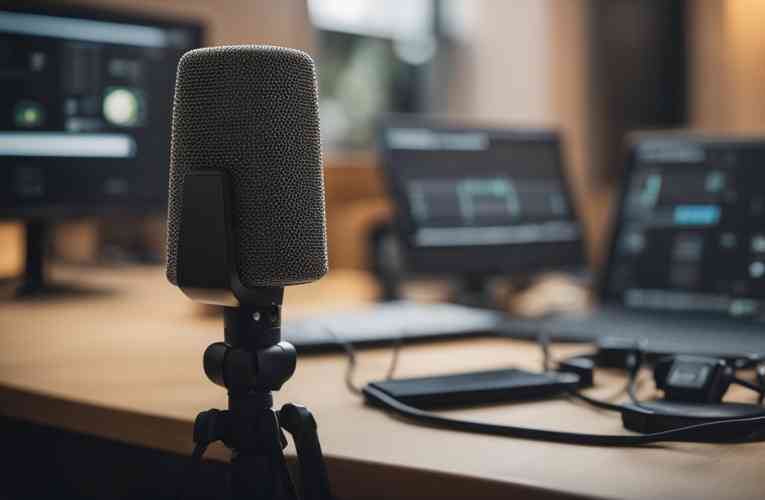Are you tired of hearing a constant hissing noise from your condenser microphone? It can be frustrating when you’re trying to record high-quality audio or communicate with others through video conferencing.
The good news is that you’re not alone. Many people experience this issue with their condenser microphones, and there are several reasons why it might be happening.
In this article, we’ll explore the common causes of hissing in condenser microphones and provide practical solutions to help you troubleshoot and fix the problem. We’ll cover everything from basic steps like checking your cables and adjusting your microphone settings to more advanced solutions like using noise reduction software. By the end of this article, you’ll have a better understanding of why your microphone is hissing and how to fix it, so you can get back to recording high-quality audio without any distractions.
Table of Contents
ToggleWhy is my condenser mic hissing?

If you’ve been experiencing hissing sounds in your condenser microphone, there are several reasons why this might be happening.
Faulty Cables or Connections
One of the most common reasons why condenser microphones hiss is because of faulty cables or connections. If the cable or connection is not properly connected, it can cause interference and produce a hissing sound.
To fix this issue, you can try replacing the cable or checking the connection to ensure it is properly connected.
Inadequate Power Supply
Another reason why your condenser microphone might be hissing is due to an inadequate power supply. Condenser microphones require a power supply to operate, and if the power supply is not sufficient, it can cause the microphone to produce a hissing sound.
Make sure that you are using the correct power supply for your microphone and that it is functioning properly.
Environmental Interference
Environmental interference can also cause your condenser microphone to hiss. This can include interference from other electronic devices or even ambient noise in the room.
To reduce environmental interference, try moving your microphone to a quieter location or using noise-cancelling software.
Internal Component Issues
Finally, internal component issues can also cause your condenser microphone to hiss. This can include issues with the diaphragm, preamp, or other internal components.
If you suspect that there is an issue with the internal components of your microphone, it is best to take it to a professional for repair.
Related Posts:
Troubleshooting Steps

If you are experiencing hissing or buzzing sounds when recording with a condenser microphone, there are a few troubleshooting steps you can take to resolve the issue. Here are some things you can try:
Cable and Connection Inspection
Check the cables and connections between your microphone and recording device. A loose or damaged cable can cause interference and result in hissing or buzzing sounds.
Try using a different cable or connection to see if that resolves the issue.
Power Supply Verification
Ensure that your microphone is receiving the correct power supply. Condenser microphones typically require phantom power, which is supplied through an audio interface or mixer. Verify that the phantom power is turned on and set to the correct voltage (usually 48V).
Environmental Noise Assessment
Assess the environment in which you are recording. Environmental noise, such as electrical interference or room acoustics, can cause hissing or buzzing sounds. Try moving to a quieter location or using sound-absorbing materials to reduce the environmental noise.
Hardware and Software Checks
Check your hardware and software settings to ensure that they are configured correctly. Make sure that your microphone is selected as the input device in your recording software and that the input levels are set correctly.
Also, check for any software effects or plugins that may be causing the issue.
Related Posts:
Preventive Measures and Best Practices
To prevent hissing in your condenser mic, it’s important to take preventive measures and follow best practices. Here are some tips that can help you avoid hissing in your recordings.
Proper Cable Management
Make sure to use high-quality cables that are specifically designed for audio recording. Low-quality cables can introduce hissing and other unwanted noise into your recordings.
Also, avoid running your cables near power sources or other electronics that can cause interference. Proper cable management can go a long way in preventing hissing in your recordings.
Optimizing Recording Environment
The recording environment can have a significant impact on the quality of your recordings. To prevent hissing, record in a quiet room with minimal background noise. If you’re recording in a home studio, consider using soundproofing materials to reduce unwanted noise.
Additionally, avoid recording near air conditioning units, refrigerators, or other appliances that can cause unwanted noise.
Regular Equipment Maintenance
Regular maintenance of your equipment can help prevent hissing and other issues. Make sure to clean your condenser mic regularly and check for any signs of damage or wear and tear. Also, keep your recording equipment up-to-date with the latest firmware and software updates.
Regular maintenance can help keep your equipment in top condition and prevent hissing in your recordings.
Related Posts:
Advanced Solutions
If you have tried all the basic solutions to fix the hissing sound on your condenser mic but still can’t get rid of it, then it’s time to consider some advanced solutions. Here are some options you can explore:
Upgrading Equipment
Sometimes, the hissing sound on your condenser mic can be caused by outdated or low-quality equipment. Consider upgrading your microphone, preamp, or audio interface to improve the quality of your recordings.
Look for equipment that has a low noise floor and high signal-to-noise ratio.
Professional Calibration
If you have tried all the basic and advanced solutions but still can’t get rid of the hissing sound on your condenser mic, it might be time to seek professional help. A professional audio engineer can calibrate your equipment and diagnose any issues that might be causing the hissing sound.
This can be especially helpful if you’re using your condenser mic for professional recordings.
Acoustic Analysis Tools
Sometimes, the hissing sound on your condenser mic can be caused by the acoustics of your recording environment. Consider using acoustic analysis tools to identify any issues with your room’s acoustics. You can use tools like Room EQ Wizard or Sonarworks Reference to analyze your room’s frequency response and identify any problem areas. Once you have identified the problem areas, you can use acoustic treatment to improve the sound quality of your recordings.
By exploring these advanced solutions, you can improve the quality of your recordings and get rid of the hissing sound on your condenser mic.
Conclusion
In summary, hissing in your condenser mic is a common issue that can be caused by a variety of factors. Some causes include background noise, interference, and microphone self-noise. To address this issue, try adjusting your microphone settings, using noise reduction software, or upgrading your microphone. Remember to always check your cables and connections, and experiment with different recording environments. By following these tips, you can reduce or eliminate hissing in your condenser mic and improve the quality of your recordings.
Frequently Asked Questions
How can I fix a buzzing noise in my microphone?
If you are experiencing a buzzing noise in your microphone, there are a few things you can do to fix it. First, check your cables and make sure they are properly connected. If your cables are in good condition, try moving your microphone away from any sources of interference such as electrical devices or other electronics. Additionally, make sure your microphone is not picking up any background noise by adjusting the gain or volume levels. If none of these solutions work, you may need to replace your microphone or have it repaired.
What steps should I take to remove hissing sound from my microphone?
If your microphone is producing a hissing sound, there are several steps you can take to remove it. First, make sure your microphone is properly grounded and that you are using a high-quality cable. Additionally, try adjusting the gain or volume levels on your microphone to reduce the hissing sound. If these steps do not work, you may need to use a noise gate or noise reduction plugin to remove the hissing sound from your recordings.
Why is there a static noise coming from my microphone?
A static noise coming from your microphone can be caused by a variety of factors, including electromagnetic interference, poor cable quality, or a damaged microphone. To fix this issue, try moving your microphone away from any sources of interference, replacing your cables with high-quality ones, or having your microphone repaired or replaced.
How can I eliminate background noise from my condenser microphone?
To eliminate background noise from your condenser microphone, try adjusting the gain or volume levels on your microphone. You can also use a noise gate or noise reduction plugin to remove unwanted noise from your recordings. Additionally, make sure your microphone is properly grounded and that you are using a high-quality cable.
What causes a microphone to produce a wind-like sound?
A microphone can produce a wind-like sound if it is picking up wind or air movement. To reduce this sound, try using a windscreen or pop filter on your microphone. Additionally, make sure your microphone is properly positioned and that you are not breathing directly into it.
How do I reduce white noise in my condenser mic recording?
To reduce white noise in your condenser mic recording, try adjusting the gain or volume levels on your microphone. You can also use a noise gate or noise reduction plugin to remove unwanted noise from your recordings. Additionally, make sure your microphone is properly grounded and that you are using a high-quality cable.








